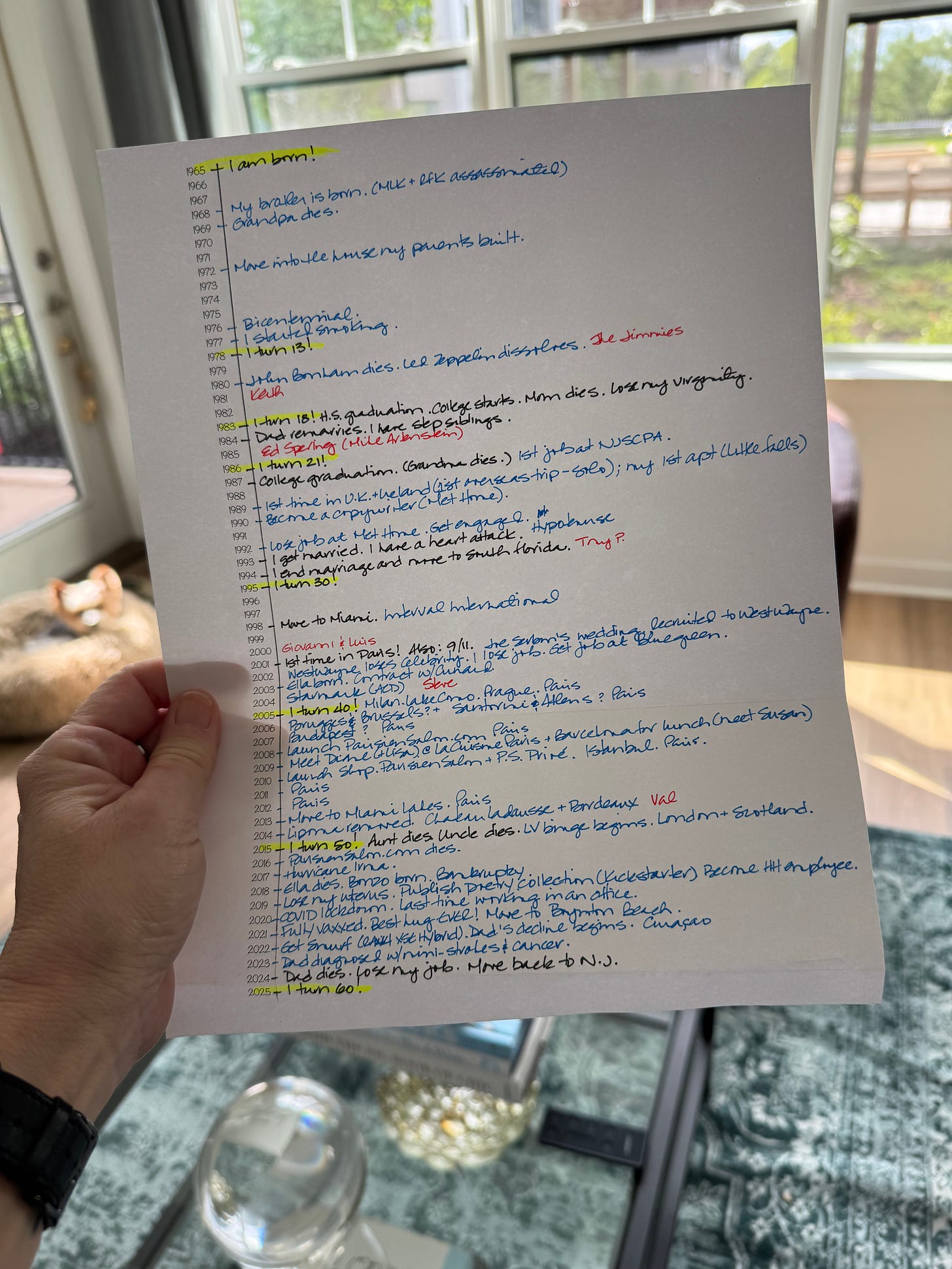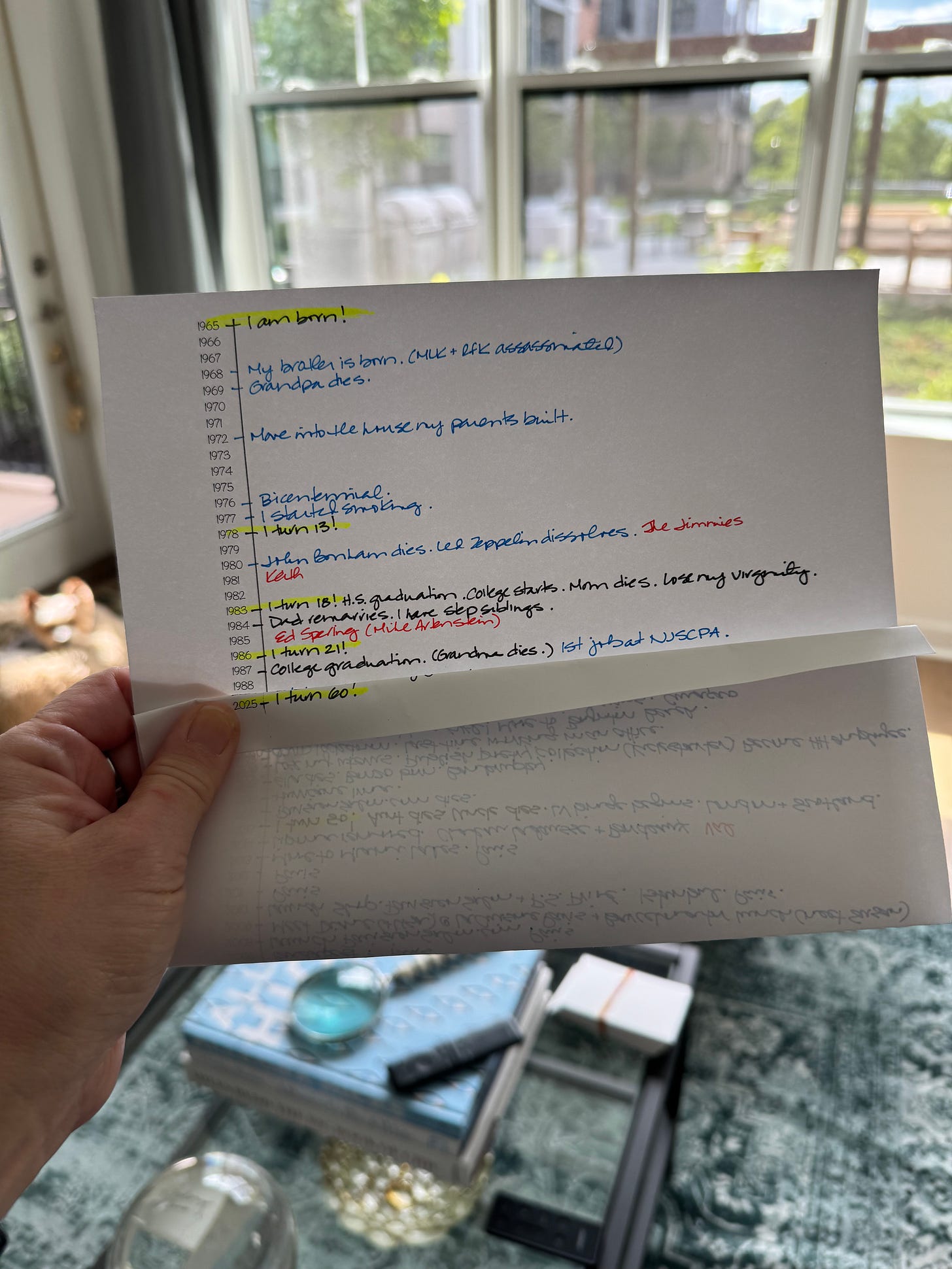Time
I’ve been thinking a lot about time, lately. Time lost. Time savored. Time spent. Time remaining.

A hundred years ago, I read a book by author Richard Bach (Jonathan Livingston Seagull) where he wrote about the concept of folding time—and though I think he meant this as his metaphysical ability to move from the present back to any point in his past, “folding time” has taken on an existential significance lately.
I can remember wanting so desperately to be an adult, but time as a student moved at a glacial pace. The twelve years of my primary schooling felt to me, at the time, to take a century. Even my four years in college seemed never-ending.
But my relationship to time shifted as soon as I had my bachelor’s degree in hand. After emptying the college apartment I shared with three roommates, I stuffed all my belongings into my brown, 1980 Datsun 510 station wagon, and drove straight from 1987 to 2025.
That’s what it feels like, at least.
I know a lot of things happened between those two points—thirty-eight years of good times and bad—but, with life speeding way above the legal limit, it’s all a blur in the rearview mirror. I know I haven’t slept through it. I’m no Ripa Von Winkle. But all the memories have been absorbed into my body at the cellular level, and rather than basking in the intensity of those individual moments, they’ve become a part of me—my own microcosm of universal consciousness.
So, I charted out the time between I was born and now, noting the milestones, the DNA-altering life experiences, my travels around the world, jobs and businesses launched, significant relationships, surgeries, global events. It all fit on a single page. That hardly feels like enough to fill sixty years, but there it is.
A twenty-something human graduating college right now would look at my timeline and judge me to be old—just as I would have at their age.
But what they don’t know is that the same thing will happen to them—hell, it’s happening to them right now. One day—a day that will feel like only a few months after they donned their caps and gowns—they’ll be able to fold their sixtieth year back to their twenty-second and wonder how it all went by so fast.
One day, they, too, will look in the mirror and be shocked to see a face staring back that shows a passage of time their brains just can’t comprehend. Their bodies will have absorbed every year they’ve lived and reflect it back to them with pains that momentarily cripple them.
It goes by so quickly.
Twenty years ago, I was forty. Twenty years from now, I’ll be eighty.
It goes so damned fast.
My father remained youthful and vibrant until, one day, he was elderly and frail. Then he was dead … and it all happened in the blink of an eye.
I don’t remember what dreams I held when I graduated from college. To be honest, I’m not sure I had any. My career meandered and unfolded without intention, much like exploring the streets of Paris for the first time. Sometimes I got turned around and lost, but other times I stumbled upon something magical. I would objectively say I was successful, but I’m not sure I was ever fulfilled.
When I had my heart attack at twenty-eight, I died. For a time afterwards, I lived what I considered a life of purpose. I swore never to take for granted the time I had been given to help save lives.
But the precariousness of time can be brutal to promises made to oneself, and I struggled with finding meaning after people tired of hearing my story. The few times I found meaning, it came with equal measures of self-doubt, which was deadly to my cause.
In the aftermath of losing my father last year and, months later, a long-held job, I’ve been trying to fold back time to see if I could learn who I dreamt of growing up to become when I was a young girl. But the bridge from then to now is too crowded with ghosts and the echoes of who I became to find that child. It’s up to the sixty year old to figure it out.
It's said that, optimistically speaking, the average human will live a life that spans 4,576 weeks. I’ve already lived 3,141 of them. If I’m fortunate, I have another 1,435 weeks to go. I haven’t yet figured out how I want to spend them, or if I have any higher purpose, but I know one thing—they’re going to speed by in a blur.
Mary Oliver’s poem, “The Summer Day,” is (to me) the perfect meditation on time—how much it gives, and how quickly it can all be taken away.
“The Summer Day”
Who made the world?
Who made the swan, and the black bear?
Who made the grasshopper?
This grasshopper, I mean —
the one who has flung herself out of the grass,
the one who is eating sugar out of my hand,
who is moving her jaws back and forth instead of up and down —
who is gazing around with her enormous and complicated eyes.
Now she lifts her pale forearms and thoroughly washes her face.
Now she snaps her wings open, and floats away.
I don't know exactly what a prayer is.
I do know how to pay attention, how to fall down
into the grass, how to kneel down in the grass,
how to be idle and blessed, how to stroll through the fields,
which is what I have been doing all day.
Tell me, what else should I have done?
Doesn't everything die at last, and too soon?
Tell me, what is it you plan to do
with your one wild and precious life?-Mary Oliver
So … how about you? Any thoughts on the time you’ve already lived and what you want to do with the time you have left?
SIDE NOTE: It’s not lost on me that a great deal of time has passed since my last post. I’ll be addressing that in posts to come.






Lately, I’ve been reflecting a lot on that very thing. The time I’ve already lived has taught me resilience, love, and the power of starting over. Going forward, I want to be even more intentional, pouring into what matters most: my faith, meaningful relationships, and the purpose God placed in me. I don’t want to just exist; I want to live deeply and leave something lasting behind. I just don’t know what that is as yet.